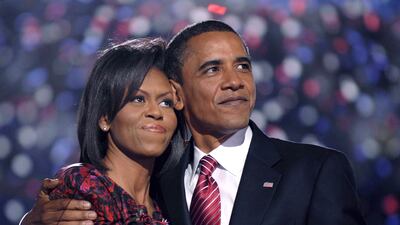Regardless of his domestic record, there are mixed feelings about the 44th president
Since Donald Trump was elected as the 45th president of the United States in November, many Americans have been fondly remembering the past eight years with Barack Obama in the White House. There have been fawning profiles of first lady Michelle Obama in the press, and a jubilant recounting of Mr Obama’s performance on a variety of domestic issues cast with an air of uncertainty about what Mr Trump will do in the Oval Office. For the peoples of the Middle East, Mr Obama’s legacy is more problematic.
The Iran nuclear deal, arguably Mr Obama’s crowning foreign policy achievement, emboldened Tehran to further its meddling in Yemen and Syria. While Iran’s nuclear ambitions might be at bay, its audacity in foreign countries, including Iraq, represents a clear and present danger to stability across the Middle East.
Likewise, Mr Obama’s failure to enforce his own red line over the use of chemical weapons in the Syrian conflict, and refusal to engage president Bashar Al Assad, paved the way for a proxy victory for Tehran and Moscow. As Mr Trump begins his term, Mr Al Assad has a better grip on control than at any other point in the conflict that has ravaged Syria. That destruction allowed militant groups such as ISIL to establish bases and expand their operations around the globe.
While these geopolitical blunders pose challenges for short-term regional politics, they are not insurmountable. And there are bright spots in Mr Obama’s legacy. The raising of some sanctions on Sudan and the support for the Saudi-led Arab coalition in Yemen have been critically important. But Mr Obama’s insistence on the use of drones to carry out assassinations and other military objectives around the world could affect American foreign policy for decades to come. Under Mr Obama’s administration, the US military created an unconstrained programme of warfare that can be controlled from office buildings in the United States. Coupled with the expansion of a global surveillance programme brought to light by former National Security Agency contractor Edward Snowden, Mr Trump will inherit a war machine unlike any other in human history thanks in large part to the Obama administration. Presidential legacies are full of competing narratives and Mr Obama’s story is far from complete.

